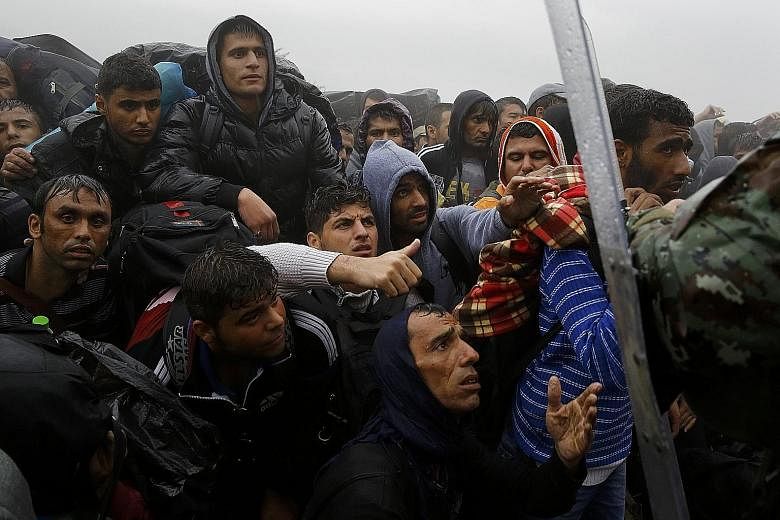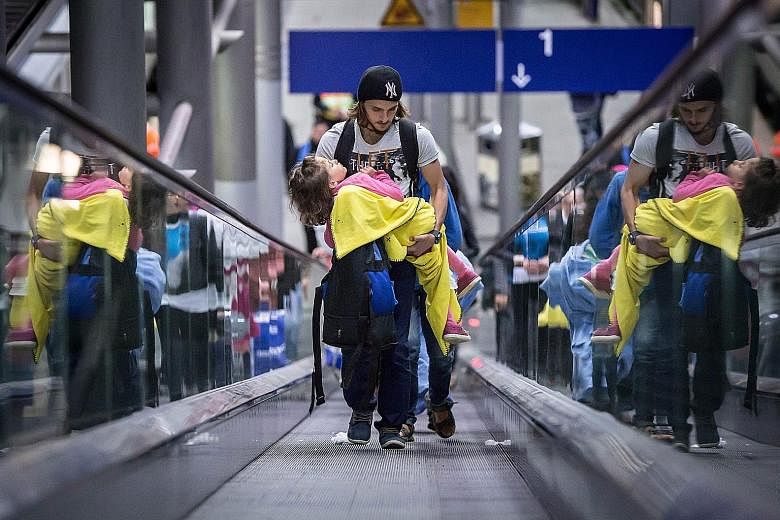BAGHDAD • Having sold his car for US$4,600 (S$6,500), and then some of his wife's jewellery, and having loaded his smartphone with photographs of his five children, all that was left for Mr Haider Abdella to do was say goodbye.
"From yesterday to today, we are crying," said the Iraqi police officer as his mother sat next to him on the couch, sobbing.
"He's never left me before, from when he was a child until now," she said. "How can I bear him leaving?"
Mr Abdella, 42, had never left Iraq; he has never even seen the sea. But earlier this month, he was on a plane to Istanbul, and from there travelled to the coastal resort city of Izmir, Turkey. A day later, he was on a smuggler's boat to Greece, crying and praying over the phone with his family left behind in Baghdad. By the weekend, he told them, he was well on his way to Germany.
Emboldened by the recent wave of media coverage, many Iraqis, Syrians and Afghans are abandoning their war-torn, economically crippled lands for Europe.
The number of refugees and migrants from the Middle East, Asia and Africa making the crossing to Europe has passed 300,000 this year, the United Nations refugee agency has said, up from 219,000 in the whole of last year.
Their reasons for leaving vary. Some, like Mr Abdella, who said he was threatened by militias, fear for their lives. Others are displaced from areas controlled by Islamic State in Iraq and Syria (ISIS) militants. Still others see no hope for themselves and their families after years of violence, joblessness and unmet promises for democracy by a corrupt political elite.
The exodus has grown so much in recent months that it has prompted appeals by national and religious leaders not to abandon their country. Former president Hamid Karzai implored young Afghans earlier this month to "stay in your country, build your homeland".
In Iraq, at a recent Friday sermon in the Shi'ite holy city of Karbala, a representative for Grand Ayatollah Ali al-Sistani, the top Shi'ite cleric, said: "We call on our youth who are disappointed with the current situation to reconsider their options and to think about their country and their people and be more patient."
But the flood shows no sign of abating. The migrant flight from Iraq alone represents a small piece of the humanitarian disaster unfolding across the region. Nearly 3.1 million people are internally displaced in the country. The International Organisation for Migration has recorded about 6,000 Iraqis arriving this year on boats to either Greece or Italy, a fivefold increase over last year. But that is just a small fraction of the number of Iraqis actually taking the journey, as most avoid being registered officially when they arrive in Greece.
In recent weeks, the phenomenon here has snowballed, as Iraqis track migrants on messaging apps like Viber and WhatsApp and hear back from friends who have reached places like Germany, where Chancellor Angela Merkel has welcomed migrants and become a hero on social media.
The stories Iraqis hear from relatives in Europe are often euphoric and full of possibility.
"When you go to Europe they treat you well, they give you a house, they pay you money, they take care of your health," said Mr Ali Hattam Jassim, 37, whose brother recently arrived in Belgium. "We have so many friends there and they tell us how great the life is."
Another Iraqi, Mr Hattam Jabbar, 28, is headed for Turkey, with the United States as a final destination.
Mr Hattam, who was purchasing tickets with his friends at a bus station in the upper-class neighbourhood of Mansour, said in the US "even the dogs live well".
The migration story has become something of a national preoccupation in Iraq, overshadowing even the war against ISIS. On a recent Friday, Baghdad's day of protest, demonstrators waved placards bearing the face of Dr Merkel, thanking her for welcoming so many asylum seekers. "God Bless You," one sign read, while another denounced Arab rulers as "filthy".
Over in Afghanistan, Mr Mirwas, clutching prayer beads and a Taleban death threat, joined a queue outside the Kabul passport office as he made plans to leave the country. He too was inspired by images of refugees being welcomed in Germany. "The floodgates are open - and this is our best chance to reach Europe," said the 28-year-old, a former translator at an American base in the eastern province of Kunar. "I hear Syrian refugees are being given priority in Germany," he said. "But I think Afghans have a good chance."
Mr Mirwais pulled out a chilling letter, purportedly from the Taleban, left on his front door one morning in 2012. "We will chop off your head for working with foreign infidels," the letter said.
Afghans constitute 14 per cent of the 381,412 people recorded as having arrived in Europe by sea so far this year, making them the second-largest migrant group after Syrians.
Four decades of war have brought endurance among Afghans, but the expanding conflict and growing economic distress have whipped up an undercurrent of hopelessness.
"Whether Germany or Austria welcomes us or not, we have to go," said Mr Haji Popal, a 65-year-old Afghan father of nine, planning a similar voyage to Europe. "We'll go wherever we are welcome."
The same sense of desperation to find a new home in Europe is to be found in Bodrum, Turkey, where Syrian engineer Ali is looking for a smuggler who can be trusted with the thousands of dollars that have to be paid to take him and his family across the Aegean in a flimsy craft to the Greek island of Kos.
"Right now I'm trying to find the best smuggler but they are all liars," said the 31-year-old from the Syrian town of Hasakah, which has been the site of a battle between Kurdish militias and ISIS terrorists.
"They give you different prices and say nothing is guaranteed," he complained, adding the smugglers were offering a price of US$6,000 for him, his sister and mother.
Bodrum has this summer become a hub for Syrian refugees from the civil war. Some who cannot pay for hotels sleep in cardboard boxes or on benches in town parks, eating scraps of food left over from the tourist restaurants.
They appear unfazed by the risks of the crossing which has claimed dozens of lives this summer. This is even after the death of a small Sy-rian refugee boy named Aylan Kurdi, whose tiny body washed up on a beach was captured in a now iconic photo that sparked a wave of horror and shock in Europe.
Indeed, many are aware that the picture swiftly caused huge change in many European Union states in the hitherto suspicious attitudes towards refugees.
Ms Ela, 20, a former psychology student in Syria, has been in Bodrum for two weeks with her two sisters who fled with her to Turkey six months ago. They sleep outside a mosque, which they use for sanitation and for drinking water. "The picture of Aylan is really sad, but I think it will help improve things for us," she said. "I don't know how to swim, neither do my sisters, so I am a bit afraid. But it doesn't matter if I die in Syria, in Turkey or in the sea."
Many who leave are in desperate straits, but some are like Tareq, a 26-year-old Syrian who made it from Damascus to the Gulf emirate of Dubai and then to Sweden in just three weeks, and in relative comfort. Last year, he took a €3,000 (S$4,800) "package", funded by his concerned, middle-class family.
But most are not so fortunate. Thousands are stuck in camps in hostile transit countries like Hungary. At a migrant camp in Roszke, on Hungary's border with Serbia, Mr Taha Shaben, 28, who said he fled Syria when his family's textile factory was bombed, scowled at those trying to muscle their way through.
"I am Syrian, you know," he said. "A real Syrian. Here, we have Pakistanis, Afghans, Iraqis, and they all throw away their papers and claim to be Syrian."
Being from war-ravaged Syria is the surest path to refugee status. "Oh yes," he said. "Everyone is a Syrian now. It is a big problem."
Five hundred metres down the railroad tracks, at the gap in the razor-wire fence, a few dozen new arrivals rested before continuing on to the distant line of police officers and television crews. "We are lost, we have no cellphones," said Pierre Alshoufi, 18, who said he was a Christian from Hama, Syria. "They fell into the Greek sea. Please, what is up ahead? Can anyone tell us what will become of us?".
NEW YORK TIMES, AGENCE FRANCE-PRESSE, REUTERS


